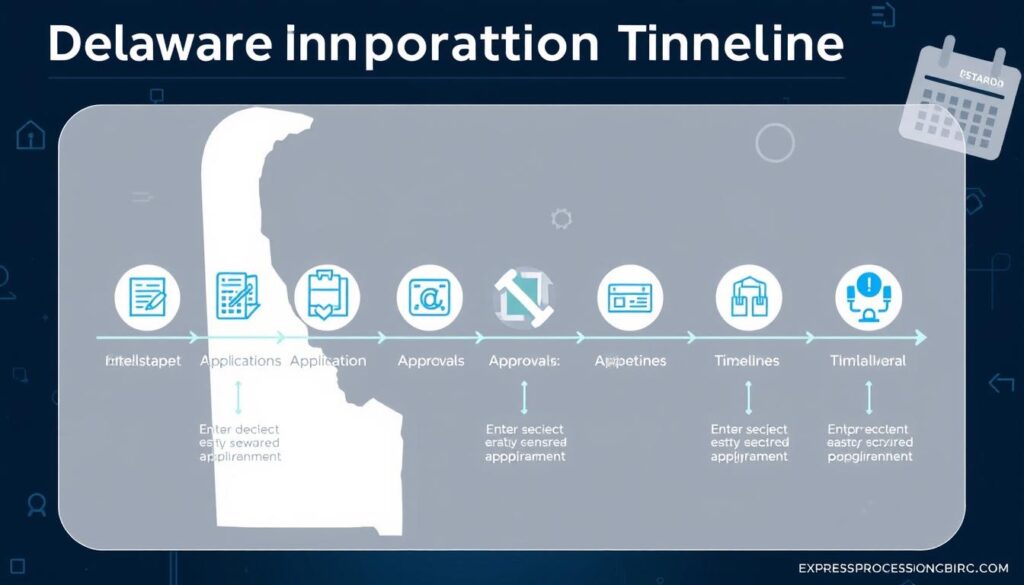Incorporating a business in Delaware is a popular move for many. The state’s business-friendly laws and the famous Court of Chancery make it attractive. But, the costs can vary a lot, and it’s important to know what you’ll pay.
This guide will cover the costs of setting up a company in Delaware. We’ll look at the fees for starting and the yearly costs to keep your business running. We’ll also talk about how the type of business, the role of a registered agent, and quick processing options affect the cost.

Key Takeaways
- Delaware is a popular choice for business incorporation due to its favorable corporate laws and the benefits of the Court of Chancery.
- The cost of incorporating in Delaware can vary widely, depending on factors such as the type of business entity, filing fees, registered agent services, and ongoing maintenance expenses.
- Understanding the complete breakdown of incorporation costs, including state filing fees, registered agent fees, and annual franchise taxes, is crucial for budgeting and planning.
- Incorporating in Delaware offers potential advantages, but it’s essential to weigh the costs and benefits to determine if it’s the right choice for your business.
- Seeking guidance from legal and financial professionals can help ensure a smooth and cost-effective incorporation process in Delaware.
Understanding Delaware’s Business-Friendly Environment
Delaware is known as a business-friendly state. It has a strong corporate legal framework that draws many companies, including Fortune 500 firms. This is thanks to its Delaware corporate law and its support for a growing business environment.
Delaware’s Corporate Law Advantages
Delaware’s corporate law is flexible and focused on businesses. It lets companies design their operations as they see fit. This flexibility makes Delaware a top choice for companies looking to improve their structure.
Why Companies Choose Delaware
Companies pick Delaware for its reputation as a business-friendly state. Its laws are made to meet the changing needs of businesses. Delaware’s stable legal environment makes it a favorite for companies of all sizes.
The Court of Chancery Benefit
The Court of Chancery in Delaware is a key reason for its appeal. This court handles corporate and commercial disputes. It’s known for its expertise, efficiency, and fairness. Companies in Delaware get the benefit of the Court’s deep understanding of corporate law.
“Delaware’s corporate laws and the Court of Chancery have been instrumental in making the state a hub for businesses across the United States and beyond.”
Basic Filing Fees and State Requirements
Starting a business in Delaware means dealing with filing fees and state rules. First, you need to file a Certificate of Incorporation for $89. Then, you must pay an organization tax. This tax varies based on the number of shares, from $30 for 5,000 shares or less to $165,000 for over 3 million shares.
To finish the setup, you must give the state some important documents:
- Articles of Incorporation
- Registered agent information
- Business purpose and other corporate details
These Delaware incorporation fees and state filing requirements are key to starting a business registration in Delaware. Knowing and following these rules helps entrepreneurs set up their business smoothly and legally.
| Filing Fee | Requirement |
|---|---|
| $89 | Certificate of Incorporation |
| $30 – $165,000 | Organization Tax (based on authorized shares) |
Understanding these Delaware incorporation fees and state filing requirements helps entrepreneurs confidently start their business. It sets a solid legal base for their company.
How Much Does It Cost to Incorporate in Delaware: Complete Breakdown
Choosing to incorporate in Delaware is a smart move for many businesses. It’s because of the state’s business-friendly laws and environment. But, knowing all the costs is key for planning your budget. Let’s explore the main expenses for setting up a Delaware entity.
State Filing Fees
The first step is filing with the Delaware Division of Corporations. The fee for a standard Certificate of Incorporation is $89. Extra fees might apply for special requests or changes.
Registered Agent Fees
Every Delaware company needs a registered agent. This person or company gets legal documents for the business. The cost for this service is between $50 to $300 a year, based on the provider and service level.
Annual Franchise Tax Costs
The annual franchise tax is a regular cost for Delaware companies. It’s based on the company’s authorized shares or its capital. The minimum tax is $175, but it can change based on the business’s details.
For example, a company with 1,000 shares and $50,000 capital would pay about $400 a year in franchise tax.
These costs are the basics, and other expenses might pop up. Like legal fees, filing service costs, and ongoing compliance needs. But knowing these main costs is essential for planning your business budget.
Additional Expenses to Consider When Incorporating
When you incorporate your business in Delaware, the state fees and annual taxes are just the beginning. You’ll need to budget for other costs to make your business setup smooth and successful.
Legal fees are a big consideration. Setting up your business involves complex legal steps. It’s smart to hire a skilled corporate attorney to guide you. Legal costs can vary a lot, depending on your situation and the lawyer you choose.
Don’t forget about accounting and bookkeeping services. Keeping accurate financial records and filing reports is crucial. Hiring a professional accountant can give you peace of mind and keep you in compliance.
You might also need to get business licenses and permits. These can include general licenses, specific industry permits, or local zoning approvals. The costs can add up fast, so do your homework.
| Incorporation Expense | Estimated Cost Range |
|---|---|
| Legal Fees | $1,000 – $5,000+ |
| Accounting and Bookkeeping | $500 – $2,000 per year |
| Business Licenses and Permits | Varies by location and industry |
By planning for these incorporation expenses, business setup costs, and legal fees, you can launch your Delaware company successfully and legally.
Comparing LLC vs Corporation Costs in Delaware
Choosing between an LLC and a corporation affects your startup costs and ongoing expenses. Delaware is known for being business-friendly. It’s important for entrepreneurs to understand the financial aspects of each option.
LLC Formation Expenses
Starting an LLC in Delaware costs $90 for the state filing fee. You also need to pay for a registered agent, which can be $50 to $300 a year. The annual franchise tax for LLCs is a flat $300.
Corporation Setup Fees
Setting up a corporation in Delaware costs $89 for the state filing fee. The registered agent fee is similar to LLCs, from $50 to $300 a year. The franchise tax for corporations varies, depending on shares, from $175 to $200,000.
Ongoing Maintenance Costs
Both LLCs and corporations in Delaware have ongoing costs. LLCs file an annual report for $300. Corporations file an annual report and pay franchise taxes, which can change based on shares.
When looking at LLC vs corporation costs in Delaware, consider the initial fees, ongoing costs, and taxes. The business entity comparison in Delaware helps entrepreneurs choose the best structure for their goals and finances.
Time Frame and Express Processing Options
Starting a business in Delaware is easy. But, how long it takes depends on your needs. Usually, it takes 2 to 4 weeks for the state to process your filing. But, if you need it faster, Delaware has express filing services.
The express filing services in Delaware can make your Delaware incorporation timeline as short as 1 business day. This fast service costs extra, from $50 to $1,000. It’s a good choice for businesses that need to start quickly.
If you’re in a hurry, remember to include the expedited processing costs in your budget. Knowing the different time frames and options helps you choose the best one for your business.

“Incorporating in Delaware can be a game-changer for businesses, and the express filing services make the process even more accessible.”
Registered Agent Requirements and Associated Costs
When you start a business in Delaware, you must choose a registered agent. This person or company acts as your official contact with the state. Knowing what a registered agent does and how much it costs is key for new business owners.
Role of a Registered Agent
A registered agent in Delaware gets important legal papers for your company. This includes service of process, tax notices, and other state communications. They must have a Delaware address and be available to receive these documents during business hours.
Commercial vs. Non-Commercial Agents
You have two choices for a registered agent in Delaware: commercial registered agents and non-commercial registered agents. Commercial agents charge a fee, usually between $50 and $300 a year. Non-commercial agents are people or businesses that do it for free.
| Commercial Registered Agents | Non-Commercial Registered Agents |
|---|---|
| Offer registered agent services for a fee, typically $50 to $300 per year | Can be individuals or entities who serve without compensation |
| Ensure compliance with state requirements and provide reliable service | May not offer the same level of reliability or services as commercial agents |
| Provide a dedicated physical address in Delaware for receiving documents | Must have a physical address in Delaware to serve as the registered agent |
When picking between commercial and non-commercial agents, think about what’s best for your business. Consider the costs and what each option offers.
Annual Compliance and Maintenance Expenses
Starting a business in Delaware means you’ll face ongoing costs. These are needed to keep your company in good shape and avoid trouble. It’s important to budget for these expenses to avoid fines or even closing your business.
The main costs for Delaware corporations include:
- Delaware annual reports – Companies must file an annual report and pay a franchise tax. The report costs $50, and the tax is based on shares, from $175 to $200,000.
- Compliance costs – Keeping up with Delaware’s laws can cost money. This includes legal fees, agent fees, and other admin costs.
- Business maintenance fees – You’ll also pay for things like a registered office, business licenses, and tax returns.
It’s key to manage Delaware annual reports, compliance costs, and business maintenance fees well. If you don’t, you could face penalties or even lose your business.
“Compliance with Delaware’s corporate laws is essential for maintaining a company’s good standing and avoiding costly penalties or complications down the road.”
Knowing and planning for these costs helps keep your Delaware business running smoothly. It ensures you stay in good standing and enjoy the state’s business-friendly laws.

Conclusion
Choosing Delaware for your business is a smart move. It offers top-notch Delaware incorporation benefits. These include strong corporate laws and the famous Court of Chancery. The costs for setting up and running a Delaware business are very competitive.
This makes it a great choice for both new and established companies. Delaware is known as a corporate haven. It has easy filing processes, strong legal protections, and a business-friendly atmosphere.
By understanding the costs, like state fees and franchise taxes, businesses can plan well. This helps them succeed in Delaware’s top corporate environment.
In the long run, the benefits of a Delaware business often outweigh the costs. This sets companies up for growth and stability. It also gives them the legal protection that makes Delaware a global leader in corporate law.
With this detailed look, entrepreneurs and business leaders can make smart choices. They can find the most cost-effective way to incorporate and do well in Delaware’s business world.
FAQ
What is the cost to incorporate a business in Delaware?
Incorporating a business in Delaware costs vary. It depends on the business type, state fees, and ongoing expenses. The basic fee for a Certificate of Incorporation is $89. But, there are more costs to think about.
What are the benefits of incorporating in Delaware?
Delaware is known for being business-friendly. It has flexible laws and a well-respected Court of Chancery. Many Fortune 500 companies choose to incorporate here.
What are the state’s requirements for incorporating in Delaware?
To incorporate in Delaware, you need to file a Certificate of Incorporation and appoint a registered agent. You also have to pay state fees. Plus, you’ll need to get any necessary licenses and permits.
What are the ongoing costs of maintaining a Delaware corporation?
Ongoing costs include the annual franchise tax of $300. You’ll also need to pay for a registered agent, which costs between $50 to $300 or more a year.
Are there any additional expenses to consider when incorporating in Delaware?
Yes, there are extra costs like legal fees and accounting services. You’ll also need to budget for business licenses and permits. Plan for these when you’re setting up your business in Delaware.
How do the costs of forming an LLC versus a corporation in Delaware compare?
LLCs have lower initial fees, but corporations have lower ongoing costs. The annual franchise tax is one example. It’s important to compare these costs when deciding.
How long does the incorporation process take in Delaware, and are there any express processing options?
Incorporation in Delaware usually takes 2-3 weeks. But, you can get it done faster with an express service. This can take just 1-2 business days for an extra fee.
What are the requirements and costs for a registered agent in Delaware?
Delaware requires a registered agent with a local address. The cost varies from $50 to $300 or more a year. It depends on the service provider and what they offer.
What are the annual compliance and maintenance expenses for a Delaware corporation?
Annual costs include the $300 franchise tax and the cost of a registered agent. You’ll also need to file an annual report for $50. These are the main expenses for maintaining your corporation.
